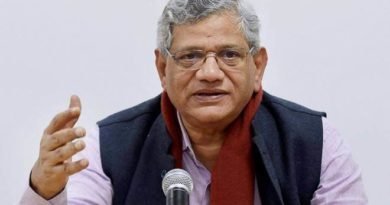600 km to home, daily wager reaches home to see his baby’s birth
New Delhi: There was panic in the air with talk of a pandemic, his job was probably gone as was the roof over his head, but Mukesh Maurya did not let his spirits flag as he set off from Delhi for his village, more than 600 kilometres away, determined to be home to see his baby being born.
There were no trains and few buses to get to Musafirkhana in Uttar Pradesh’s Amethi district all the way from Rajouri Garden where he worked as a daily wage labourer, but get there he did.
It was March 28, Saturday, when he set off for home, 650 km away. The nationwide lockdown to curtail the spread of COVID-19 had begun after Prime Minister Narendra Modi’s March 24 announcement and all roads to home it seemed were blocked.
But where there is a will there is a way, and 22-year-old Maurya, who reached home on Sunday evening, found it.
It took many hours of walking, several more hours of waiting and three gruelling, very crowded bus rides, with social distancing a random, distant thought.
I reached just in time. My wife was having labour pains when I reached our village and we had to quickly arrange for an ambulance to take her to hospital, Maurya, now a proud father of a baby boy, told PTI over the phone.
I could manage to be there with my wife when my son was born, he added, the three days of stress and the arduous journey home seemingly already a distant memory.
The young man, who earned about Rs 8,000 a month as a daily wage labourer in Rajouri Garden on west Delhi erecting tents and pandals’ for weddings and other events, said he waited for three days from Wednesday to Friday for the situation to improve and to find some way to leave.
When it didn’t, he just packed his belongings in a backpack and started walking, joining the exodus of many thousands of migrant workers trekking back to their homes with no food, no jobs and no savings.
Several hours into the walk, he said, they were told the Uttar Pradesh government would run bus services on Saturday from Anand Vihar in east Delhi to ferry stranded migrant workers.
Notwithstanding the threat of coronavirus infection, he joined the throng of workers to find a spot in the bus on Saturday night. In what was the beginning of 20 hours of bus rides, with the passengers packed in like sardines, the Uttar Pradesh Road Transport Corporation (UPSRTC) bus first took him to Sitapur.
There, he waited for five hours for another bus to Lucknow. From Lucknow, he took a private bus to his village in Musafirkhana.
It was expensive, costing him Rs 1,200, but worth every rupee, he said. He finally managed to reach his village on Sunday evening. Hours later, on Monday morning at around 11 am, his wife delivered a baby boy, who he said is yet to be named.
Maurya, who has been working in Delhi for more than a decade, ever since he was a little boy, is safe with his family, which also includes his parents, three brothers who work as labourers in brick kilns and a younger sister.
Life is difficult. His parents till their two bighas’ (roughly an acre) of land and also work as labourers in neighbouring fields.
The challenges are many, he said.
After the lockdown, he was told by his contractor there would be no work for at least the next few days and maybe longer. He was also receiving frantic phone calls from his family, their worries compounded by the coronavirus outbreak in the national capital.
There was so much stress. I had no work and I was getting constant calls from home to come back. Initially, there was no transport, so I decided to walk down like others. Then on Saturday, channels started flashing the news that the Uttar Pradesh government had started the bus services from Anand Vihar, making the journey easier, he said.
The stresses are over but only for the moment.
His wife is in hospital with the baby while he is under lockdown at home. But that’s a small worry.
It’s the bigger questions that haunt he has to start earning a living again and get back to Delhi but doesn’t know how or when.
Asked when he would come back to the national capital, he replied, As soon as this (coronavirus) crisis ends. But when will that be?
A question to which nobody has an answer.
PTI



